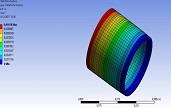Analysis of Tensile Strenght and Shear Modulus of GRE Pipe using Ansys
DOI:
https://doi.org/10.19184/cerimre.v1i1.19544Abstract
Composite materials (GRE pipe) had been applied in various industries. These kind application are based on the advantages of composite properties, that are lightweight, high corrosion resistance and low cost. In order to make a lightweight and strong materials, some materials that light and stiff had been widely used, lie fiber glass, epoxy and the other. These materials (fiber glass and epoxy) are synthetic and non-biodegradable, but give some advantages in composite to make composite more stiff, light and strong. Mechanical properties of fiber glass composites had been doing based on theory through modeling. Theoretical results obtained showed that maximum stress and shear modulus value of GRE pipe are less than each components (glass fiber and epoxy resin). Each value of maximum stress and shear modulus are 584,57 MPa and 46,15 MPa.








